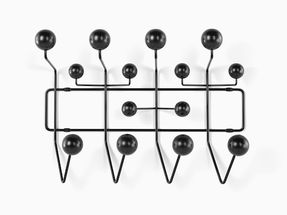
Hermanmiller Eames Hang-it-all
EAMES HANG-IT-ALL COAT RACK
EAMES HANG-IT-ALL COAT RACK
Designed by Charles and Ray Eames
With their Hang-It-All, Charles and Ray Eames elevated the everyday coat rack into something inventive and fun. First crafted with multicolored hooks and a white wire frame.
The Material and colorway offering has since expanded with fidelity to the sophistication—and sense of play—of the original. To create the rack’s wire frame, which attaches to walls or other structures, Charles and Ray and the Eames Office applied the mass-production techniques for welding wires they had developed for earlier designs.
The Frame has a durable powder coat finish, and each of its angular bends is capped with solid wood balls. Still noted for its whimsy, the Hang-It-All is also appreciated as a useful piece of art.
DESIGNER
CHARLES AND RAY EAMES
Ray Eames designed a variety of whimsical toys and furniture pieces specifically for children, including this 1953 piece for Tigrett Enterprises’ Playhouse Division.
Why children’s products? For purely personal reasons: Charles and Ray wanted to give them to their own grandchildren and to the children of friends. With a grand sense of adventure, Charles and Ray Eames turned their curiosity and boundless enthusiasm into creations that established them as a truly great husband-and-wife design team.
Their unique synergy led to a whole new look in furniture. Lean and modern. Playful and functional. Sleek, sophisticated, and beautifully simple. That was and is the “Eames look.”
That look and their relationship with Herman Miller started with molded plywood chairs in the late 1940s and includes the world-renowned Eames lounge chair, now in the permanent collection of the Museum of Modern Art in New York. Charles and Ray achieved their monumental success by approaching each project the same way: Does it interest and intrigue us? Can we make it better? Will we have “serious fun” doing it. “The role of the designer is that of a very good, thoughtful host anticipating the needs of his guests.”
They loved their work, which was a combination of art and science, design and architecture, process and product, style and function. “The details are not details,” said Charles. “They make the product.”
INFORMATION
DETAIL
The Hang-It-All—along with molded plywood animals, small-scale chairs and tables, elaborate cardboard-and-paper masks, and brightly colored building blocks—were all given the same careful design consideration as the couple’s furniture designs. To achieve the Hang-It-All’s spidery base, the Eameses used the mass-production techniques for welding wires that they developed for their wire-base tables and wire chairs.









